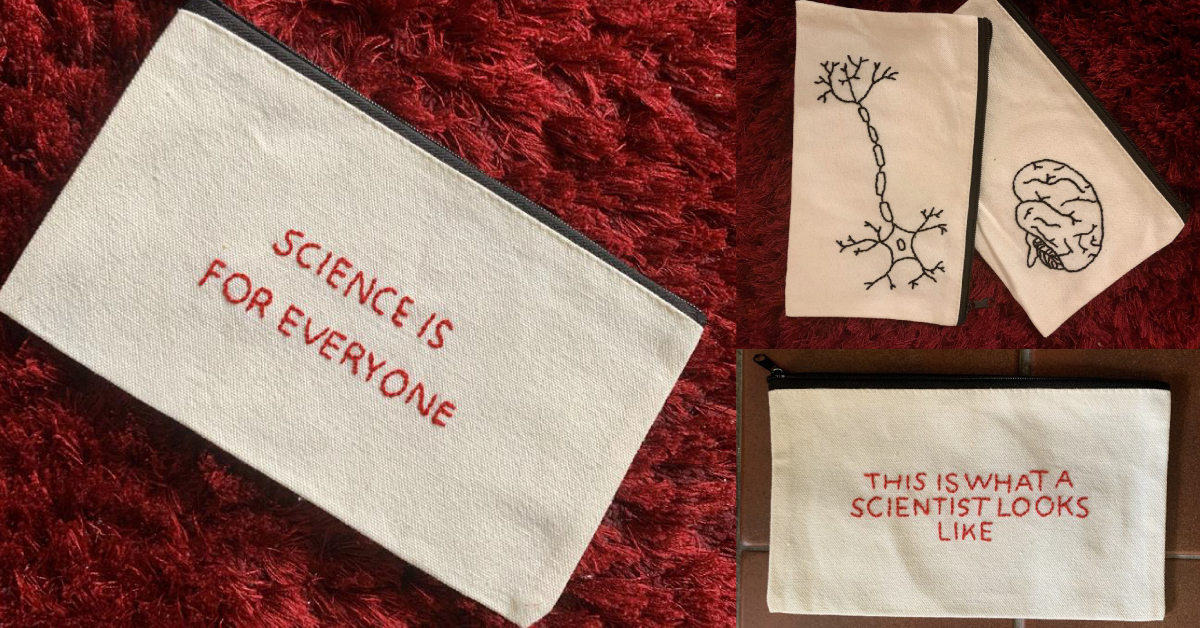Michelle Naessens is a Research Assistant at the University of Cambridge who is fundraising for our programme by selling embroidery projects on Etsy. We spoke to her about her journey from sixth-form to scientist, and what advice she would give to young people thinking of pursuing a path similar to hers.
“At age 16, I really wanted to become a psychologist. The human mind has always fascinated me and I was intrigued to find out what made people tick. Hence, I chose to do my undergrad in psychology. I never thought I could do anything like neuroscience and had only taken biology (not physics or chemistry) in secondary school as I thought I wasn’t smart enough. It also didn’t help that my school had the culture of “a passing grade is more than enough”.
At university I encountered people that were very engaged during lessons, asked questions, and were generally extremely passionate about learning, which inspired me to be better and push myself. Still, I didn’t think I was actually smart enough to do more hard-core science subjects but this was proven wrong when I challenged myself by picking a cognitive science module in my final year. I aced it and following my undergrad in psychology, I moved on to do a neuroscience MSc which I completed last summer.
I’m still fascinated by the human mind but now I’m studying the biological underpinnings instead of the behavioural output per se. At the moment, I work as a research assistant in the centre for frontotemporal dementia and related disorders at the University of Cambridge. I look at how different forms of neurodegeneration present themselves using different ways of looking at the brain in patients (MRI and EEG mostly) and how damage to certain areas of the brain leads to very specific errors in someone’s thinking and behaviour. On a day-to-day basis, I recruit participants, schedule their research visit, conduct cognitive assessments (tests of memory and thinking), accompany them to their brain scan, and analyse all the data that results from their visit.
What I enjoy most about my job is that I’m always learning. I don’t think there’ll ever be a day when I think, yes I know enough now, I’ve learned it all. That’s the beautiful thing about working in academia. We’re discovering things that no-one has studied before and yes, often, that makes us feel stupid. But it’s this passion about wanting to understand things that drives us forward. That, in combination with wanting to help people affected by this awful disease. It’s really touching to see that patients and their loved ones are willing to sacrifice their time and comfort (a research visit can be quite tiring and stressful) for something that does not directly benefit them. It really makes me appreciate humanity and our potential for altruism.
My advice for young people thinking about their own career pathways in science is this:don’t wait for life to happen to you. As cliche as it sounds, you are the main character, the active agent that moves the story forward. All the things I’ve regretted up until now are things I could have changed by just being assertive and pushing myself out of my comfort zone. You need to make things happen to grow. Pick an essay topic that’s slightly too difficult, listen to educational podcasts (personally, I love the sci-guys), volunteer for a society, email researchers if you could help them with something, start writing a blog, go and annoy people on Twitter (my favourite past time). The most important thing is to just do it. Yes, you might feel like you don’t belong in the scientific world sometimes and that everyone else is so much smarter. But that’s how we all feel. Imposter syndrome is rife in academia, but that doesn’t mean we’re incompetent and neither are you.
Science is ever evolving and thinking outside of the box is a large part of that. That’s why we need more women in science, and people from different backgrounds. It’s impossible to move forward if we keep looking at science through the same archaic lens, we need you!”
We are extremely grateful to Michelle for supporting our work through her fundraising and sharing her insights with us now. Follow her on Twitter @NeuroNutterBlog and don’t forget to check out her amazing embroidery work for sale on Etsy.

